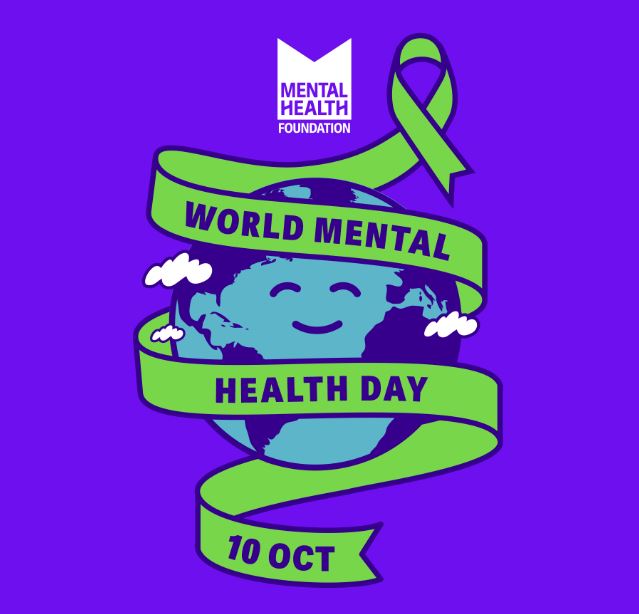“It is time to prioritise mental health in the workplace. “
World Mental Health Day takes place on the 10th of October. An annual campaign, celebrated since 1992, which aims to raise awareness around the issue. Supported by the World Health Organization (WHO), and the World Federation for Mental Health (WFMH).
The official theme this year, (set annually by the WFMH), is: “It is time to prioritise mental health in the workplace “. The Mental Health Foundation UK states, “The theme highlights the importance of addressing mental health and wellbeing in the workplace, for the benefit of people, organisations, and communities.”
In 2019 the WHO estimated that one in eight people were living with a mental disorder. The onset of the Covid-19 pandemic then created a global crisis with extreme pressure and stress impacting the emotional health of millions of people. Estimates suggest that this number could now have risen by up to 28%, with the US National Institute for Mental Health (NIMH), suggesting that 1 in 5 adults in America are currently living with a mental illness.
Many hoped the situation would improve as we returned to normality, but whether it is the long-term effects of such a global disaster, or the impact of other worrying world events –including the Ukraine-Russia war, escalating violence in Israel, Gaza, and Lebanon, and the growing tension throughout the Middle East; the number of individuals struggling with mental health disorders appears to be continuing to increase.
Psychological health is equally as important as physical health, and one can have a serious impact on the other. Disorders such as depression increase the risk of long-term chronic conditions like diabetes and heart disease. Similarly, those with chronic conditions are more at risk of developing a mental health illness.
Over 60% of the world’s population is in work, and many of us will spend a large proportion of our week at work. The Mental Health Foundation UK estimates that 15% of UK workers have an existing mental health condition and 875,000 workers are suffering from work-related stress, depression, and anxiety.
This mental health day, the WFMH and the WHO want to shine a light on a major issue affecting individuals in the workplace, burnout.
Burnout is a condition that leaves sufferers feeling bodily and emotionally exhausted. It is usually caused by long periods of intense pressure, vast responsibility, or excessive stress. Any of which can leave individuals depleted and overwhelmed physically and mentally.
In many instances, the condition is related to one’s job and is sometimes referred to as executive or occupational burnout as it is the result of chronic work-related stress. This could be because of long working hours, too much responsibility, being drained by constant or incessant demands on one’s time or energy, or a toxic work environment.
Read more about how your job could be affecting your mental health in our blog – https://www.ibizacalm.com/is-your-job-affecting-your-mental-health/

The stress and exhaustion lead to feelings of helplessness, cynicism, disillusionment, and resentfulness. It can also manifest in physical symptoms such as headaches, stomach problems and an increased vulnerability to cold and flu like viruses. The individual will feel like running away, unable to face situations, and day to day issues can feel overwhelming.
Burnout is often accompanied with mental health conditions such as anxiety, depression, or substance abuse.
One of the biggest issues with mental health disorders is that they often leave the person suffering in isolation. This means too many individuals are not getting the assistance they require. Possibly because of fear, embarrassment, or they are just not aware that support is available. It can be incredibly difficult to admit that there is something wrong in the first place, and then it takes huge courage to speak up.
World Mental Health Day is a chance to talk about mental health, how we need to look after it, how important it is to talk about things and how to get help if you are struggling.
What is mental health?
Mental health refers to our intellectual, developmental, and emotional well-being. A mental health illness, sometimes referred to as a disorder, can disrupt our thoughts, feelings, and behaviours.
The state of our psychological health has an impact on every part of how we live. It colours our emotional outlook; affects how we look after our physical health and needs; and has an influence on all our relationships – with loved ones, friends, and the people that we mix with at work or school.
Some of the most common illnesses include:
There are many more, and all of them can range from being occasionally or mildly disruptive to a person’s life, through to having a serious daily impact; and can cause individuals to self-harm, abuse substances and attempt suicide.
What causes mental health illnesses and disorders?
There is no single cause for mental illness. It can affect anyone, irrespective of age, race, or social class. Personality, life experiences, and physical health can all play a part in someone developing a mental health problem. Some people are genetically more predisposed to these types of illnesses; whilst others can develop one because of a single violent or shocking incident.
Stress and trauma can be triggers. Whether it happens to the individual themselves, or someone close to them, distressing experiences can have a major effect on physical and mental well-being.
Events such as:
Other factors that can contribute to the risk of developing a mental illness include:
It is also important to remember that a person’s mental health can change over time. Along with experiencing a significant event, individuals can also be affected when the demands placed upon them go beyond their coping abilities. If they must endure long periods of intense pressure, vast responsibility, or excessive stress. For instance, if they are working long hours, caring for a sick relative, or struggling with financial difficulties – any of which can leave individuals depleted and overwhelmed physically and mentally.
Potential early warning signs of a mental health problem.
If you are worried that someone you love may be struggling with a mental health problem.Here are a few signs to look out for:
If you recognise one or more of these symptoms either in yourself or in someone you are close to, or if someone you love is acting erratically and out of character, then talk to them, ask them how they are feeling, try and start a conversation and if in doubt seek professional advice.
Mental health awareness and treatment
Mental health problems are more common than people think, but help is available. People can and do get better, and many recover completely. Treatment often involves therapy and medication, or a combination of the two.
Talk therapies such as cognitive behavioural, which is popular as it teaches an individual to think and behave differently so they are more able to manage, or stop, triggering episodes.
Medications such as antidepressants which are favoured for depression, these will help balance the chemicals in the brain, impacting on mood. They can also be used as a chemical treatment for anxiety, along with anti-anxiety drugs and beta-blockers. Other prescription drugs are available to treat specific conditions; and it is important to get checked out thoroughly by a health care professional and to follow their advice.
A more recent breakthrough in treatment for mental health conditions (such as addiction) is TMS or transcranial magnetic stimulation. TMS is a non-invasive form of brain stimulation therapy that has proved highly effective in the treatment of neurological conditions.
Personalised mental health and addiction rehab clinic in Spain

Located on the Balearic Island of Ibiza, set in a private, idyllic, and tranquil location, our Spanish residential rehab centre is the perfect place to get help.
We treat clients with a variety of mental health conditions including depressive, anxiety, and eating disorders, drug and alcohol misuse, substance abuse and behavioural addiction, codependency, and trauma.
For more information, or details on admission to our rehab centre please contact sharon@ibizacalm.com

